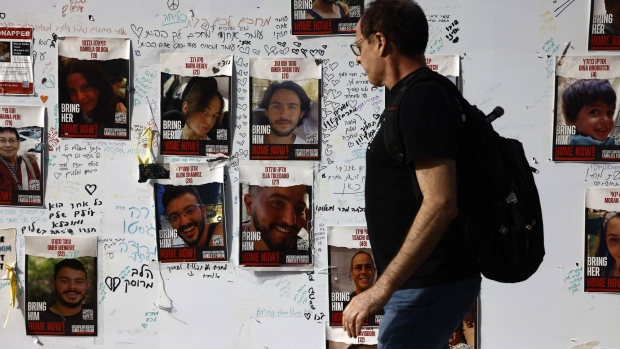Nov 22, 2023
Cease-Fire Won’t End Israel’s War on Hamas But Might Change It
, Bloomberg News

(Bloomberg) -- The guns will go quiet, food and medicine will get to those in desperate need and hostages will be exchanged for prisoners. That may sound like the start of a process to end the brutal six-week-old war between Israel and Hamas, which has reduced much of Gaza to rubble.
It almost certainly is not.
Israeli Prime Minister Benjamin Netanyahu made that clear, shortly before his cabinet agreed early Wednesday to the deal. “We are at war and we will continue the war,” he said.
His words signal disappointment in store for the many countries — from the Arab world to Europe — that have been urging a short-term cease-fire in the hope it will lead to something more enduring.
Read more: Israel and Hamas Agree to Short Truce for Hostage Release
As for the US, Israel’s chief backer, its position is somewhat different. Washington joined the calls for a pause but recognizes that fighting is likely to resume. It just wants Israel will conduct the war with more restraint when that happens.
‘Transition to Cease-Fire’
Most of the world is simply telling Israel to stop.
With more than two-thirds of Gaza’s 2.2 million residents displaced from their homes, and some 14,000 killed, according to the Hamas-controlled health ministry in Gaza, the drive to eliminate Hamas has triggered growing alarm.
Hamas, which is designated a terrorist organization by the US and European Union, killed 1,200 Israelis in its attack on Oct. 7, according to Israel’s government, and abducted an additional 240. Its fighters and infrastructure are based among civilians and in tunnels beneath them.
Now that one halt in fighting has been agreed, some diplomats say more can follow. “I hope that the deal can be the basis for extended pauses and then transition to a cease-fire,” said Saudi Foreign Minister Prince Faisal Bin Farhan.
The US has urged pauses for humanitarian aid and hostage releases but not in hopes of ending hostilities quickly. The Biden administration’s view has been that in order to destroy Hamas – a goal the US says it shares — Israel needs to fight more carefully, which may mean fighting for longer.
Four senior US officials, speaking on condition of anonymity, said Washington has told Israel that killing too many Palestinian civilians will make it harder to pursue the campaign against Hamas to its conclusion.
‘Careless or Complacent’
Some Israelis have expressed concern that the four-day cease-fire — which is expected to begin Thursday morning and may be extended if more hostages are freed — could cause trouble for its military.
Much of Israeli life is essentially on hold, and the economy is suffering, with hundreds of thousands on reserve duty. A few fighting-free days might create the desire for more, while slowing the military’s momentum.
“The soldiers in the field who are at the pinnacle of a highly accomplished offensive effort will go into static mode,” analyst Yossi Yehoshua wrote in the Yedioth Ahronoth newspaper. “The commanders will have to keep them from growing careless or complacent.”
‘They Cannot Stop’
The deal struck in recent days is little different from one rejected by Israel weeks ago. But two things have happened since.
The families of hostages have campaigned effectively to place that issue above military victory. And weeks of punishing air attacks and ground fighting have achieved some gains.
Since the hostages were victims of Israel’s failure to defend its border and protect its citizens on Oct. 7, there’s been a growing sense that to abandon them again by walking away from a deal would be inexcusable. But then the war will start again.
“It’s very clear to the decision-makers that they cannot stop,” Yaakov Amidror, a former Israeli national security adviser, told reporters. “Israeli sentiment will not let them. If they stop after the four, five or six days of cease-fire, that will be the end of this government.”
Amidror acknowledged that the coming pause might allow Hamas to replenish and restore its forces, but he said that won’t change the balance of power or significantly affect Israeli losses.
Even if the pause works as intended in Gaza, one unknown is how it will affect the exchanges of fire between Israel and Hezbollah across the Lebanese border — which appear to have intensified in recent days.
Why Hezbollah Is a Wild Card in New Mideast Fighting: QuickTake
The Iran-backed militia isn’t officially part of the Gaza cease-fire deal. It might hold fire anyway, which could allow some of the tens of thousands of Israelis who evacuated the north to return to their homes. Or Hezbollah might see a a chance to double down on attacks.
Whatever comes of the pause in fighting, most of the developing world is furious that Israel isn’t being forced to stop its campaign entirely.
“Why is Israel allowed to do everything it wants in defiance of international law?” asked Jordanian Foreign Minister Ayman Safadi. “And why isn’t anyone doing anything about it?”
--With assistance from Fiona MacDonald, Simon Marks and Gwen Ackerman.
©2023 Bloomberg L.P.


